Publisher’s Note: On Monday, January 21, 2020, several residents of the neighborhood brought their concerns to the Manchester Board of Mayor and Aldermen. A link to the media video with their comments is published below the audio recordings of the neighborhood meeting that have been provided with this article.
On Monday, January 13, 2020, about 120 residents of a Ward 2 neighborhood met with city fire, legal and planning officials to discuss the surprise and illegal opening of two “sober homes” around the corner from each other; the first at 70 Russell St., the second at 296 Orange St. Also present were Jonathan Gerson, Executive Director of Blueprint Recovery Centers and their attorney, as well as officials from Liberty House, the only homeless shelter specifically for veterans in Manchester, which announced it was moving into the Bishop Peterson Residence for retired priests, just a block away at 221 Orange Street. The meeting was convened by Ward 2 Alderman Will Stewart in the Community Room at Mt. Carmel Nursing Home. The audio of the meeting is posted at the end of this article. (All photos will enlarge when clicked.)
It was a contentious meeting with neighbors aiming their frustration both at Gerson for acting in violation of the law and city officials for not taking what they deemed were appropriate enforcement actions. Indeed, city officials often said that the situation was “complicated” and “very complex” because of the opioid crisis and various state and federal laws that may convey special protections upon these facilities. Despite their stated fears and complexities, city officials did not produce any specific statutes that prevented them from following local fire and zoning codes in dealing with these facilities. Instead, they, notably Fire Chief Daniel Goonan, used the opioid crisis and the need for recovery and transitional housing it created, as a reason to relax standards to facilitate their operation. Goonan, who believes there are about 60 of these facilities operating around the city, said this to the gathered neighbors:
“The need for these types of residences is huge. We all know we’re in this drug crisis and with that brought a lot of different changes to our housing stock. Because what we’ve seen is a big uptick in folks trying to help. I don’t want to say some are good and some are bad, but there’s a lot of people out there that, you know, are fresh out of recovery that want to get a place going and want to help as many people as they can.
We see…we see everything out there. It’s a Wild West Show out there. It really is. We don’t know where these places are. When we put a list together, that list is made up of my firefighters, officers, my fire prevention division just getting reports, going to ambulance calls, going to fire calls and coming back to fire prevention or myself and saying ‘I think we have a sober living facility.’
Now really, in the Fire Code, there’s no such thing as ‘sober living.’ We don’t even have them. So, when we check out a place, we look (at) are there three people living there that are unrelated because then it’s a rooming house. Now, if I had to do that to all the places out there, I’d be closing everybody down. Knowing that there’s a big, a massive drug issue out there and such a huge need for housing and good transitional living, we started to look at these places and say ‘okay, how can we work with these folks to get these buildings at least relatively safe, so I can sleep at night, and the people who are coming out of treatment and into early recovery can have a safe place to stay because, you know, that’s what they deserve. I’m certainly an advocate for that.
You know, we don’t really look at the zoning part of it. All’s I know is that we want to have a building, and generally, these places are multi-family buildings, and we see a lot of…let me give you an example. So, I’ll have a captain call me up and say ‘I just went to this building. We had a small fire in there and I think there’s a sober living facility there because there’s a crapload of people in there. Three floors are full.’ So, we’ll go check it out and they’ll come to us and say ‘we’re really not a sober living facility. We’re just a family living in sobriety.’ That’s what we’ll get with some of them because they think I’m the bad guy coming in. But, really, what we want to do as the Fire Department, is we’re willing to help you make this building safe.
The problem is there’s a lot of people out there doing it maybe to make some dough and there’s other folks doing it for the right reasons thing to ah, you know, help people. The folks that are in your neighborhood, as far as we’re concerned, are the latter. You know, they work with us. They come to the Fire Department and say to us ‘ how can we do this better. Help us get through the process so we can have a place that’s relatively, you know, that you can support as somewhere being safe. Now, I’m not talking about where they should operate, I’m just saying how, you know, in our eyes, how, what it should look like.
So, we’ve supported a couple of bills along the way. In the last four years, we’ve been up to Concord many, many times trying to get some legislation out there so at least we can say ‘okay this is a safe building, a relatively safe building’, and it can go through a variance process with the State Fire Marshall so we can say okay you’re all set to operate as far as we’re concerned. We’ll inspect once or twice a year and we’ll be safe…
As the meeting went on it became clear that there were challenges to, and in, what Goonan said. While it is true that the city’s zoning ordinance does not define “sober home” or “sober living,” it does define the term “congregate housing” as follows:
- Multifamily housing or other dwelling units serving individuals who require on-site services that support independent living, including, at a minimum, communal dining facilities. Congregate housing may be characterized by on-site personal care services,
housekeeping and linen service, and the supervision of self-administered medication, but excluding 24-hour nursing care.”
This is important because it means that those who claim the city’s zoning ordinance “doesn’t allow for sober living” are either ignorant of the zoning ordinance’s provisions or are saying it so that they can locate outside of the eight zones in which congregate housing is allowed, including the R-3, C-1 and C-2 zones by right and the R-SM, B-2, CBD, RDV and AMX zones with a Conditional Use Permit from the Planning Board.
The neighborhood in question is in zoned R-2, which is defined in the zoning ordinance thusly:
- The R-2 district forms a loose band around the densely developed inner city area, representing a transitional district between lower development densities of the single family districts and the maximum densities of the inner city. This district was established to maintain the integrity of existing moderate density neighborhoods that are nearly fully developed with a mix of single family and two family structures, but which are close to the Central Business District.
Director of Planning and Community Development Leon LaFreniere told the neighbors that the use at 70 Russell Street was discovered during a routine Certificate of Compliance (CoC) inspection of the two family home. He told residents that it was clearly not being used as a two family and that, after discussion with building representatives, he determined it was congregate housing because of its operational structure, which includes on site “house managers” to provide services and oversee the now individual residents living in the building. According to city tax records, the building has a total of just 5 bedrooms.
During the meeting, it was disclosed that the building’s third floor was being used to house residents, which both Goonan and local Fire Marshall Peter Lennon said they were unaware of. The fire code requires a sprinkler system to be installed for such usage. If the building’s operators were working with the Fire Department, as claimed, how could it be that it did not know about the use before the CoC inspection or the code violations before the neighborhood meeting? Goonan did not respond to an emailed question from Girard at Large about what the department will do now that it knows the third floor is being used in violation of the city’s fire code.
When asked whether or not the Fire Department had provided the addresses of the suspected sober facilities to the Department of Planning and Community Development so they could do their inspections and determine whether or not they were operating in conformance with zoning and other ordinances, Goonan said:
We meet with these guys every Friday so I think we’re kind of on the same page as far as what we find or what you find. I mean, we talk a lot.
When told it was a simple “yes or no” answer and pressed on whether or not they had turned over any addresses, LaFreniere answered before Goonan saying:
We have not received any addresses from the Fire Department.
Goonan then said they’ve not been turned over because they’re “suspicions” though he did say “they’re pretty good suspicions.” He justified it this way:
All’s I’m trying to do as the fire chief, is I’m worried about the people being safe, whether it’s the neighbors in the adjoining building, or if it’s the folks in recovery, I just want to try to have people as safe as possible in each building, understanding that there’s a big huge, there’s a really large need for safe sober living, good sober living and transitional housing. It is what it is. This is what we’re fighting right now. Maybe I should be talking to these guys more but I don’t think they’re going to take enforcement any action to close places down like some people want.”
So, while Goonan said they don’t look at the zoning aspect of the properties, he’s also not forwarding the addresses of the properties they visit on their “pretty good suspicions” to the department that does. When asked by a neighbor about overdoses, which have taken place at the 296 Orange Street facility, a 3 bedroom single family home now housing 11 unrelated individuals, Goonan said:
These places here. I mean, do we go to a lot of these places for overdoses? Yeah, sometimes.
Goonan discussed his efforts to get state legislation to address “the problem,” citing his input into HB 311, which he said had just passed the NH House of Representatives. That bill “allows alcohol and drug free recovery houses to be granted an exemption by the state fire marshal for requirements of the state fire code and local amendments” so long as the facilities meet several criterion, one of which is NOT compliance with local zoning requirements. LaFreniere does not support the bill because it does not require those seeking an exemption to conform with local zoning. He says he shared his concerns with Goonan, who was talking with bill sponsors Erika Connors (D-Ward 8), Patty Cornell (D-Ward 11) and Jeff Goley (D-Ward 1). Goley is also a Manchester firefighter.
When questions about whether or not decisions to support such legislation should be left to the Board of Mayor and Aldermen, as the elected body that determines policy for and represents the city, Goonan said he was only responding to legislator questions in his capacity as the fire chief. He pushed back against suggestions that he had overstepped his bounds by advocating for such legislation without approval, arguing he wasn’t going to get the positions of politicians before he did what he saw as his job. He admitted he had not notified the board of the legislation or his position on it.
After the meeting, Girard at Large questioned Goonan about the significant changes to the bill in the version that passed versus the one that was introduced. As introduced, that bill gave local communities the option “to adopt an ordinance regulating the occupancy and safety of dwelling units operating as sober living facilities.” Goonan replied:
Any input that I had was on the original version of HB311. How it got to were it is now has nothing to do with us and up to who ever sits on that committee. I did not know what the final product looked like. Senate has it now and I am sure they will change it again. Either way we will have some direction and hopefully a definition of sober living. Our intent was to get some sort of a mechanism to register or license these facilities and have a reasonable set of safety measures to guide enforcement.
(For the record, Girard at Large has confronted one online media outlet in the city for falsely linking to the original version of the bill. The publication changed the link to the current version but didn’t change it’s reporting which reflected the terms of the original bill nor did it update the story to even note the link was changed. It has been again confronted for peddling “fake news” as their story totally misrepresents the legislation. We will update this story if they change theirs.)
For their part, Gerson’s attorney admitted to neighbors that they were a business operating in violation of the zoning ordinance. He said they “got off on the wrong foot” and were seeking the neighborhood’s forgiveness and its permission to keep operating. He said they accept insurance payments on behalf of their clients. “We’re a business. We get insurance, alright?” was his answer to questions about the operation. When asked about whether or not he agreed with LaFreniere’s determination that they were a Congregate Living Facility, the attorney said “yes.” When challenged about his statement that the city doesn’t allow for sober facilities when it allows for congregate living in eight different zones, he changed his position and said he didn’t agree with LaFreniere’s decision.
Gerson was pressed by several neighbors about whether or not he knew his operation violated the zoning ordinance. He blamed those doing “due diligence” on the purchase before a neighbor who has bought and sold several rental properties explained to the audience how Gerson had to have known given the process of getting a Certificate of Occupancy for multi-unit dwellings. He said Gerson had to have received a “CO for a 2 family.” The assertion was not disputed either by Gerson or city staff. Others questioned how the parent company, located in Maryland with operations is several states that paid cash for both buildings, didn’t know it needed to check with local zoning. Finally, one neighbor challenged him on why he hadn’t applied for a variance on 296 Orange Street, which was purchased and opened after the city confronted him about the operation of 70 Russell Street.
“That has no relation to me,” Gerson said of 296 Orange St. His attorney said, “Orange Street is news to me. This is the first I’ve heard of it.” Then several neighbors unloaded the evidence that he was involved, to which he said: “I’m in the process of applying for a variance,” to the guffaws of the crowd. Clearly, he’d been caught in another lie.
Editorial comments:
According to a story in the New Hampshire Business Review, Goonan is now “talking with people who operate sober houses to see if they would take in those individuals (homeless) when (shelter) beds aren’t available.” One has to wonder about the conflict of interest that exists when the regulator goes to the regulated seeking their help with a problem when they are, themselves, likely operating in violation of the city’s regulations. No doubt the entity running the illegally operating homes in this neighborhood would be eager to assist.
Clearly, Goonan’s withholding information from zoning officials and the elected body that oversees his operation. While I do not fault his motives, I do fault his methods. In the meeting with residents he made his support for HB 311 clear, support that seems to remain despite his saying he had nothing do to with the changes to the original. It’s difficult to understand how he didn’t know of such significant changes; changes that strip away local authority and give greater rights and status to these facilities than to those that conform to the zoning ordinance. More to the point, it’s difficult to understand why he would not get the input of the city’s governing body on something that would directly and literally impact every neighborhood in the city. This isn’t “an every little thing” type of thing Goonan said he would refuse to go to the board for. It’s a big thing and to the decision to support legislation like this or not is not his call. It belongs to the Board of Mayor and Aldermen which, no doubt, would seek his input alongside that of officials like LaFreniere who oppose it and residents who will be impacted by it.
The city has a remedy for this “crisis” and it’s found in the definition of Congregate Housing, which is published above. These homes have “managers” that, by their own admission, live on sight, provide services and oversee the their clients’ behaviors and activities. (Not for nothing, they don’t seem to do a good job of it, either. Ask a neighbor.) No doubt, many of the areas in which these facilities are operating, would be allowed by the current zoning ordinance. In fact, Liberty House, which didn’t get a chance to speak at the meeting, is moving into the C-1 zone that is just a block or two away from these properties. Whether the neighborhood likes that one or not, it’s allowed.
The Fire Department was questioned about the status of 273 Dubuque Street, another property that Gerson is involved with. It’s a 3-family sober living facility housing 21 clients. The Fire Department said it needed a sprinkler system to conform to the code. They said they couldn’t afford the $75,000 cost. Goonan looked at Lennon for an answer. He said, they’re “still working on it”…nine or ten months after citing the violation. Yes, it’s still operating. What other property owner would get away with operating in violation of the code for months on end?
As the chief admitted, these houses are often the site of overdoses. As public safety officials have said in the past, dealers tend to find these places looking for their old customers and some new ones along the way. Packing them into a neighborhood like is being done here is dangerous for all concerned, especially those in recovery. Eleven people in a 3 bedroom house? Seventeen in a two family with five bedrooms? Just one block away, a single family turned rooming house with another twenty one residents? Now add Liberty House with twenty seven, all within the same three block area. Oh, and there are significant and large houses for sale in the neighborhood. Will they be next if this isn’t stopped?
Families don’t want to live next door to something that is likely to draw drug dealers into the neighborhood or be, by their own admission, a revolving door where people are moving out every six to twenty six weeks, never mind live in an area where they’re clustered together like this. The Board of Mayor and Aldermen needs to make clear its opposition to HB 311. It also needs to revisit the problematic definition of family in the zoning and enact placement restrictions, similar to those governing Halfway Houses, for these facilities. Concentrating them is bad for any neighborhood because it’s bad for their clients. Finally, it should also put Chief Goonan on notice that he is to bring to their attention bills like this and seek their guidance on whether or not the city’s elected government, or any of its appointed departments, should express support, opposition or seek amendment. For that matter, Manchester’s state reps. should seek the input of their locally elected officials in public session before submitting legislation that would remove their ability to deal with such issues locally.
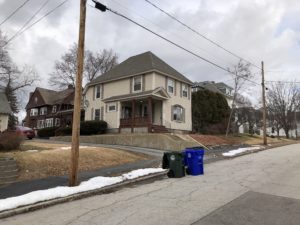
296 Orange St. 11 people now live in this 3 bedroom single family home. It’s 1 block from 70 Russell St.
We can’t but shake our heads at the irony of HB 311, which, in the name of safety, lessens safety codes. Would it make things “more safe” than they are now? If one considers the Fire Department’s refusal to enforce current codes or notify planning regulators of these properties, it just might. However, were the department to enforce those codes and share the addresses with the planning and zoning folks so they could enforce theirs, clearly, the new rules would not provide greater safety than the one’s that are currently being ignored or subverted.
Finally, to address the need for this type of housing, we again say the city should look to it’s current definition of congregate housing and encourage operators to look where it’s allowed by right and go through the process of getting a conditional use permit where it’s allowed by exception. If it allows these illicit operations to stand, it will have set a blueprint for countless others to follow. This is a case where if everybody just did their job by following the law, the issue wouldn’t need to be resolved.
Ward 2 Neighborhood Meeting Part 1, Monday, January 13, 2020.
Ward 2 Neighborhood Meeting Part II, Monday, January 13, 2020
Ward 2 neighbors petition the Board of Mayor and Aldermen on January 21, 2020. Comments start at about 4:45 into the meeting.

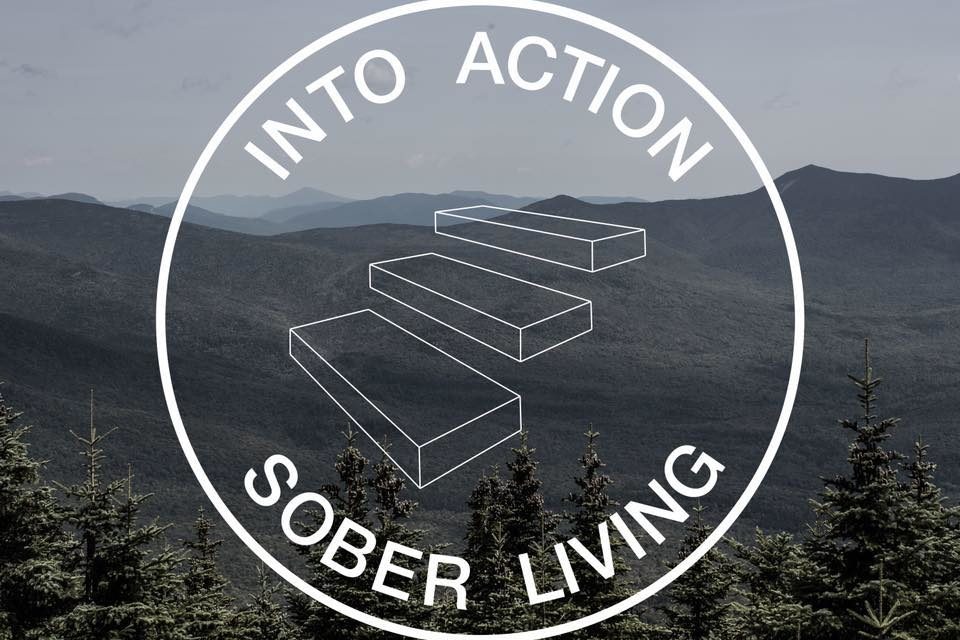

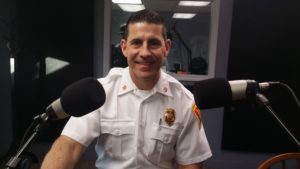
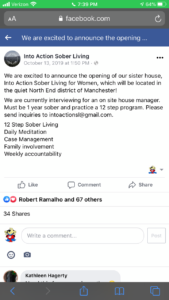






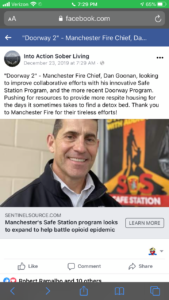

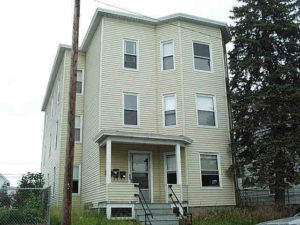
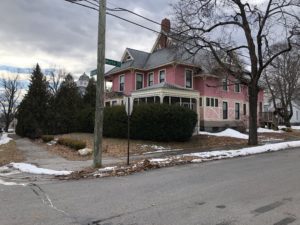
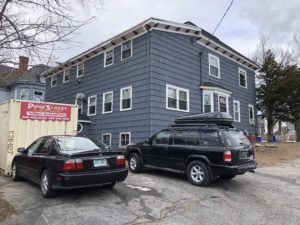

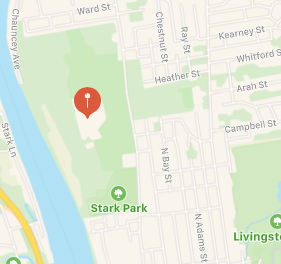
I just moved back to Manchester (Ward 2) in July and my car and my son’s car were broken into a week after we moved in. Only some change was taken. I was told by a neighbor it was probably done by some residences of the “sober” home around corner looking to get some money to score some drugs. It appears to be regular occurrence in the neighborhood.
Sadly, it is. The one night I recently left my truck doors unlocked, I got cleaned out. Whether it was from residents of the sober facility or someone else, having these places in the neighborhood is only going to attract more folks who’ll be checking door handles in the hope of scoring some quick cash.